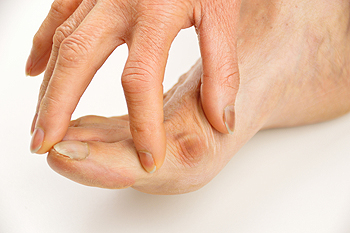 The tarsal tunnel is a narrow tunnel in the , next to the bone, that serves as a pathway for nerves, veins, arteries and tendons. Tarsal tunnel syndrome occurs when the tibial nerve in this tunnel gets squeezed or pressed. Common causes of tarsal tunnel syndrome include osteoarthritis, rheumatoid arthritis, diabetes, overpronation (rolling) of the foot, or a cyst or ganglion that can form near the tunnel. Symptoms of tarsal tunnel syndrome include a burning pain that radiates to the arch of the foot, numbness in the sole of the foot and worsening of symptoms after running or standing for a long time. If you believe that you might be suffering from tarsal tunnel syndrome, it is important to visit a podiatrist for a proper diagnosis and treatment. Treatment options that may be considered include cold therapy, medication, injections, specific exercises, corticosteroid injections or surgery.
The tarsal tunnel is a narrow tunnel in the , next to the bone, that serves as a pathway for nerves, veins, arteries and tendons. Tarsal tunnel syndrome occurs when the tibial nerve in this tunnel gets squeezed or pressed. Common causes of tarsal tunnel syndrome include osteoarthritis, rheumatoid arthritis, diabetes, overpronation (rolling) of the foot, or a cyst or ganglion that can form near the tunnel. Symptoms of tarsal tunnel syndrome include a burning pain that radiates to the arch of the foot, numbness in the sole of the foot and worsening of symptoms after running or standing for a long time. If you believe that you might be suffering from tarsal tunnel syndrome, it is important to visit a podiatrist for a proper diagnosis and treatment. Treatment options that may be considered include cold therapy, medication, injections, specific exercises, corticosteroid injections or surgery.
Tarsal tunnel syndrome can be very uncomfortable to live with. If you are experiencing tarsal tunnel syndrome, contact Brent Harwood, DPM of Southeast Podiatry. Our doctor can provide the care you need to keep you pain-free and on your feet.
Tarsal Tunnel Syndrome
Tarsal tunnel syndrome, which can also be called tibial nerve dysfunction, is an uncommon condition of misfiring peripheral nerves in the foot. The tibial nerve is the peripheral nerve in the leg responsible for sensation and movement of the foot and calf muscles. In tarsal tunnel syndrome, the tibial nerve is damaged, causing problems with movement and feeling in the foot of the affected leg.
Common Cause of Tarsal Tunnel Syndrome
The Effects of Tarsal Tunnel Syndrome
A physical exam of the leg can help identify the presence of tarsal tunnel syndrome. Medical tests, such as a nerve biopsy, are also used to diagnose the condition. Patients may receive physical therapy and prescriptive medication. In extreme cases, some may require surgery.
If you have any questions please feel free to contact one of our offices located in Fairhope, Brewton, and Atmore, AL . We offer the newest diagnostic and treatment technologies for all your foot care needs.
Read more about Tarsal Tunnel Syndrome Bunions that develop in young children are referred to as juvenile hallux valgus. They may exist as a result of genetic traits, or from wearing shoes that do not have adequate room for the toes to move freely in. Noticeable signs that your child may have a bunion can include a bony protrusion that forms on the side of the big toe, and red and swollen appearance. A proper diagnosis can consist of having an X-ray taken, as this may help to determine how severe the bunion is. When the bunion is identified at an early stage, it may be effective to use non-surgical techniques to obtain mild relief. These can include wearing shoes that have a wide toe area, or using custom-made insoles that may help to alleviate pressure. If your child has a bunion, it is strongly suggested that you seek the counsel of a podiatrist who can properly treat this condition.
Bunions that develop in young children are referred to as juvenile hallux valgus. They may exist as a result of genetic traits, or from wearing shoes that do not have adequate room for the toes to move freely in. Noticeable signs that your child may have a bunion can include a bony protrusion that forms on the side of the big toe, and red and swollen appearance. A proper diagnosis can consist of having an X-ray taken, as this may help to determine how severe the bunion is. When the bunion is identified at an early stage, it may be effective to use non-surgical techniques to obtain mild relief. These can include wearing shoes that have a wide toe area, or using custom-made insoles that may help to alleviate pressure. If your child has a bunion, it is strongly suggested that you seek the counsel of a podiatrist who can properly treat this condition.
If you are suffering from bunion pain, contact Brent Harwood, DPM of Southeast Podiatry. Our doctor can provide the care you need to keep you pain-free and on your feet.
What Is a Bunion?
Bunions are painful bony bumps that usually develop on the inside of the foot at the joint of the big toe. As the deformity increases over time, it may become painful to walk and wear shoes. Women are more likely to exacerbate existing bunions since they often wear tight, narrow shoes that shift their toes together. Bunion pain can be relieved by wearing wider shoes with enough room for the toes.
Causes
Symptoms
In order to diagnose your bunion, your podiatrist may ask about your medical history, symptoms, and general health. Your doctor might also order an x-ray to take a closer look at your feet. Nonsurgical treatment options include orthotics, padding, icing, changes in footwear, and medication. If nonsurgical treatments don’t alleviate your bunion pain, surgery may be necessary.
If you have any questions, please feel free to contact one of our offices located in Fairhope, Brewton, and Atmore, AL . We offer the newest diagnostic and treatment technologies for all your foot care needs.